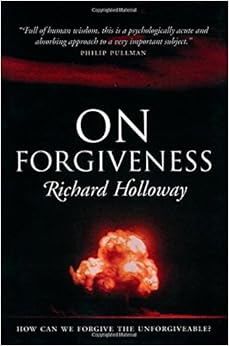On Forgiveness
 Our attempts to understand the nature of forgiveness often involve making distinctions by degrees. Forgiving someone for being late for an appointment seems simple compared to an accident when bodily harm has been caused. Making these kinds of distinctions provides us with a better sense of when forgiveness can be offered. But what if making these kinds of distinctions was not only misguided but misinformed about what it means to forgive? What if the conditions for forgiveness were the same for all instances – if the capacity to forgive a minor transgression was no different than those cases in which we feel someone to be unforgivable?
Our attempts to understand the nature of forgiveness often involve making distinctions by degrees. Forgiving someone for being late for an appointment seems simple compared to an accident when bodily harm has been caused. Making these kinds of distinctions provides us with a better sense of when forgiveness can be offered. But what if making these kinds of distinctions was not only misguided but misinformed about what it means to forgive? What if the conditions for forgiveness were the same for all instances – if the capacity to forgive a minor transgression was no different than those cases in which we feel someone to be unforgivable?
In On Forgiveness, Richard Holloway attempts to answer these questions by meditating on a provocative statement by French philosopher Jacques Derrida: “There is only forgiveness, if there is any, where there is the unforgivable.” How might considering the unforgivable change the way we understand forgiveness?
The book, updated since its first publication in 2002, draws on a rich variety of sources from philosophy, the Bible, poetry, and Holloway’s experience of helping people when he was an official of the Scottish Episcopal Church. He identifies the main obstacle to understanding forgiveness as the kind of calculative thinking often involved in moral thought. His reasons are convincing. The human situation is so historically and psychologically complex that attempting to attribute blame in order to correct relations between people when things go wrong is impossible. Consider how someone’s personal history may determine how he or she behaves, and is something for which he or she is not responsible, or the complex circumstances when groups, cultures or nations are pitted against one another by virtue of events that occurred neither during the recent past, nor were the result of any single decision but of a complicated state of affairs. Attempts to correct wrongs, a corrective justice, cannot rely on what Holloway calls “a rational system of moral accountancy” because it can never make sense of these types of historical complications. Instead, attempts to correct wrongs in this manner often reinforce a cycle of revenge, in which resolving one set of wrongs leads inevitably to retaliation.
Holloway points out that this criticism has another implication; conditional acts of forgiveness do not break with this moral accountancy, but rather operate within it. In identifying why a person can be forgiven, one determines the degree of harm caused. This way of meting out forgiveness may work on many occasions, but it often does so because the one who forgives has been able to accept the degree of harm. In situations where this is not possible, conditional forgiveness is not only difficult, but fails to address how the transgressor can be held accountable without invoking the spirit of revenge arising from moral accountancy. What then is left?
Holloway ventures forgiveness in an unconditional sense. If historical complexity makes it impossible to accuse and forgive specific actions and people, then we are left with the dilemma of either insisting on a corrective justice in bad faith or, more radically, forgiving unconditionally. Unconditional forgiveness supposes that historical complexity makes us all equal, in the sense that each one of us is bound to relations and events over which we do not have total control.
Unconditional forgiveness seems feasible in relation to trivial wrongs, but Holloway sees it applying to those matters which we think unforgivable, such as apartheid and the Holocaust. Holloway is not saying that such deeds should be forgotten, but that they require being addressed in another manner that does not perpetuate retaliation. The paradigmatic example of this is the work of Nelson Mandela and how his approach to rebuilding South Africa did not follow the path of corrective justice. Yet Holloway entertains no illusions about the enormity of this kind of understanding and the amount of work it asks of the individual in terribly difficult circumstances when they or a loved one has been harmed. This is why forgiveness can never be commanded or instituted at a collective level. “There is no politics of forgiveness,” as Paul Ricoeur, a colleague of Derrida, once said; forgiveness is something which requires individual reflection. Can we, as individuals, rethink our relations with others from the height of unconditional forgiveness? The book seems to suggest that to at least try is itself a victory, while to ignore it leads down an all-too-familiar hellish path of recurring violence.
Todd Mei

Leave a Reply